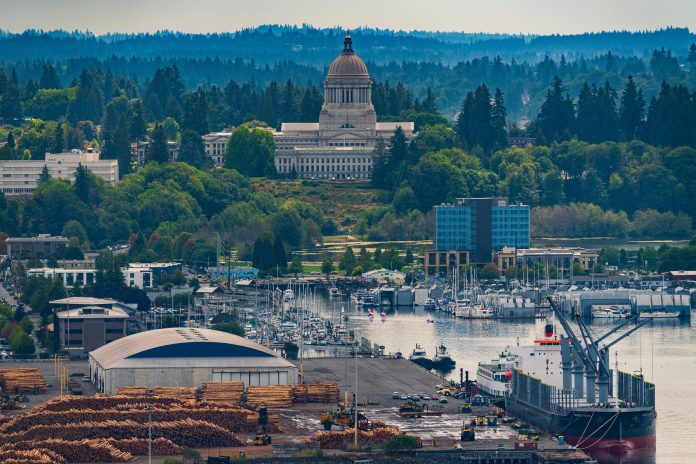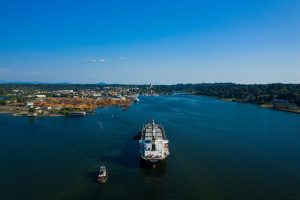
Submitted by Port of Olympia
There is an old adage that global forces impact local lifestyles. But how can a ship that got sideways on the other side of the world in the Suez Canal have any repercussions here in Thurston County? Welcome to the active domino game known as global trade.

On March 23, the container ship M/V Ever Given lost ability to steer as it maneuvered through a dust storm and ran aground in the Suez Canal. It would remain in a diagonal position blocking other vessels from transiting the canal for the next week until the spring tide helped free it from its grounding. The Suez Canal provides transit for countless ships per year particularly on trade routes of connecting the Middle East, India, China and the Far East with Europe by connecting the Red Sea with the Mediterranean Sea. This 120-mile connection saves ships about 10 days of sea time heading south around the Cape of Good Hope and the challenging and unpredictable seas off the South African coast. The fallout of last month’s delay was a backup in ships, goods not moving, and most importantly more impacts to the imbalance of containers across the world.
Historians will debate what the greatest invention was during the 20th century. Perhaps it was medicine, or the automobile or the airplane. Many logisticians would argue that it was the containerization of goods as this one act changed global trade providing much cheaper goods to consumers. Most of our global goods such as electronics and clothing travel across the world in containers. The containerization of ships freed manufacturers to load goods at a warehouse at the origin and truck that container to a port where it would be loaded off the truck and onto a ship for transport before being offloaded onto a truck or rail in the U.S. and taken directly to warehouse stores. Economies of scale are gained in shipping more containers on one ship across longer distances. Containerization has become a fundamental aspect of globalization where the U.S. consumers benefit from lower costs on foreign goods. A part of this has been the principle of “Just In Time,” which works to lower costs by reducing inventory management costs by having the supply chain provide goods as they are needed. An essential element of globalized container trade is maintaining a balance of available containers moving efficiently through the supply chain to keep this just in time principle. This balance of containers is what is currently impacting efficient global trade.

Prior to the M/V Ever Given’s unfortunate grounding, the global market was recovering from the global recession caused by COVID. The shutdowns from the pandemic wreaked havoc on container balances. As the largest global exporter, China, shut down, the rest of the supply chain kept moving its containers. As China slowly got back online, the largest importers of containers, U.S. and Europe, had their own shutdowns. The outcome was a mass shortage in empty containers finding their way back to China. The imbalance in container supply versus the cargo demand has created an increase in shipping costs. Container ships are earning tremendous returns based on the high demand for more container movements. This brings us back to local impacts.
For each consumer in Thurston County, the costs of transportation are driving up the costs of goods sold. Gas prices continue to rise. You may see higher costs for various goods during your personal shopping. For Thurston County’s public global market player at the Port of Olympia, the resulting increase of rates in the container market hurt a potential new revenue opportunity. Over the last few months, Matson, a U.S. flag shipping company mostly moving containers between U.S. ports, started conversations on laying up a ship at the Port of Olympia, known as lay berth. Matson’s normal business operations results in having an extra ship that they use as an insurance policy to insert into their Hawaii and Alaska supporting routes when their normal ships head to ship yards or a ship breaks down. Matson and the Port of Olympia negotiated a lay berth contract that would allow their spare vessel to remain docked in Olympia for five years with provisions to put it into use on an as need basis. This would have locked in significant revenue for the Port of Olympia while maintaining Matson’s need for local backup support. However, the high shipping rates forced their commercial team to reconsider holding that ship on backup support. They instead decided to put their spare vessel into the global trade in order to maximize their own revenue opportunities.
Maritime trades and the business of the Port of Olympia’s marine terminal is challenging to predict and when a good opportunity like this one falls through, it often leaves the public asking questions as to what else could have been done. This is a great example on how a ship blocking the Suez Canal for a week impacted a company’s decision to lay its vessel up in Olympia and why your clothes, electronics, and gasoline are costing much more than they did a few months back. And the fascinating thing is something may happen tomorrow across the world that could completely change the current financial situation.



















































